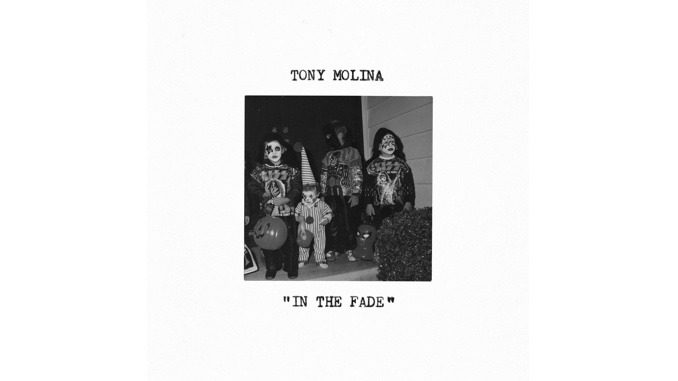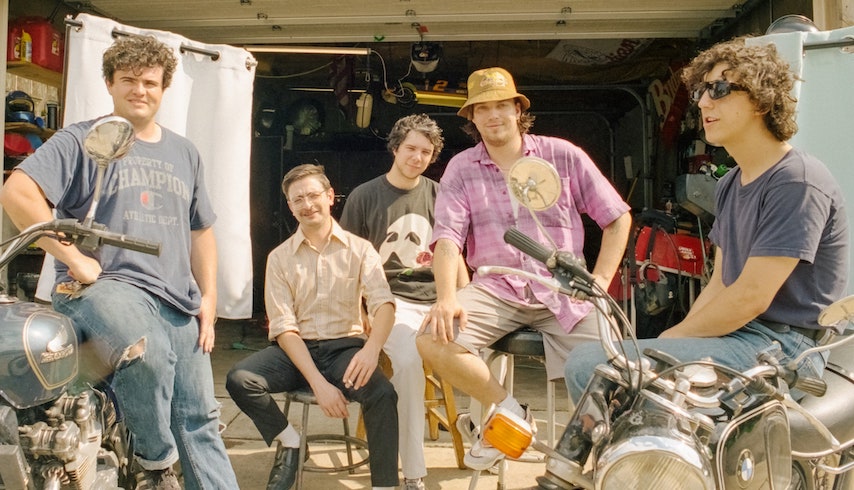The last thing Tony Molina is going to do is bullshit you, bore you or waste your time—a writing role model, if ever there was one. The California-born songwriter started out in DIY hardcore bands, and took to releasing bite-sized power-pop tunes as a solo artist over a decade ago. The bridge between these two phases of his career was Ovens, Molina’s disgracefully slept-on quintet, known for running a unique gamut of heavy and hooky sounds. It was with Ovens that Molina found his voice as a songwriter—”The songs I write sound like shit / And now that you’re gone, I know that I won’t be missed,” he sang on Ovens’ 2009 tune “Everything’s the same,” no-bullshit to a fault—and it’s to Ovens that he returns, at least in part, with In the Fade. Molina ties his entire career together on this record, rejecting the notion that an artist can only move in one direction at a time.
The bullet points of Tony Molina, the solo act, are these: He’s released three proper studio LPs (plus 2019 compilation Songs from San Mateo County). These albums average 10 tracks and 12 minutes in length—In the Fade is his longest yet at just 18 minutes. (“I don’t know if I write songs intentionally short. It’s easier to do short,” he told Paste in 2014. “I don’t need a song to be standard length just because I feel like it should be a standard length, you know? It doesn’t need to fucking repeat. Why does it have to repeat? You’ve got to be a really good songwriter to have a song that’s long and have it not be boring.”) His foremost sonic modes, of which there are two, evoke the melodic power-pop and guitar-rock of Fastbacks, Weezer and Thin Lizzy—see: his 2014 solo debut Dissed and Dismissed—and the sunny folk- and jangle-pop of The Byrds and Beatles—see: his subsequent solo albums, 2016’s Confront the Truth and 2018’s Kill the Lights. His solo output is remarkably focused from album to album; Molina picks a sound and sticks to it, only shifting gears on a track or two per LP, at most. He usually sneaks in a cover near the end (In the Fade closes on a rendition of Black Sabbath’s “Fluff”), and works snatches of others’ songs into his own at will, making his influences explicit. His lyrics tend to be about breakups. He is physically incapable of writing a lousy melody.
Molina is fine with you knowing who he is as a songwriter—in fact, he insists upon it. What’s he’s not fine with is being misrepresented or misunderstood. That’s why one particular aspect of the critical response to Kill the Lights didn’t sit right: “I kept hearing: ‘Oh, he’s maturing, he’s getting into other shit, writing more mature stuff,” he says in press materials. “I thought, ‘Man, that’s kinda lame, no I’m not … ’” On In the Fade, Molina refuses to be boxed in by that narrative, not only calling renewed attention to his Ovens days (to which the “mature” sounds of Kill the Lights can trace their roots), but also redefining the scope of his songwriting in a way that feels triumphant and true to who he is. (He does this with the help of his longtime collaborators Jasper Leach, Jack Shirley and Bart Thurber, with whom he first worked on Kill the Lights, Dissed and Dismissed and his 2008 tape Embarrassing Times, respectively.)
In the Fade’s foremost Ovens throwbacks are paired at the center of the album: “Song for Friends (Slight Return)” updates “Headache” (and references “Your ego will grow,” both) from Ovens’ self-titled 2009 compilation album, while “Ovens Theme Pt. 4” continues a series of instrumental interludes that began on Ovens (2009) and continued on … also Ovens (the band’s 2011 EP). The songs share a soft touch, as if Molina is observing that he hasn’t outgrown these sounds, per se—they’ve been part of his sonic DNA for over a decade, and will continue to be. “Song for Friends” is immersive where the Ovens version was DIY-threadbare, opening on “Strawberry Fields Forever”-esque mellotron and electric guitar (also reminiscent of Confront the Truth’s “I Don’t Want to Know” and “Hung Up on the Dream”), then swelling with acoustic guitar and organ as Molina mourns faltering friendships; the latest “Ovens Theme” is equally Beatles-y, though it’s only a 30-second acoustic interlude. There’s a wistful gratitude to these tracks, like Molina’s way of reconnecting with those friends he thought he’d left behind.
But of course, In the Fade is much more than a nostalgia trip—it’s also a cross-pollination of Molina’s go-to sounds, to an extent that hasn’t been seen since the Ovens era. Take “All I’ve Known,” a standout from the album’s back half: Molina sings about feeling resigned to the sidelines over max-gain power-chord crunch and upbeat drums, bemoaning, “Humiliation’s all I’ve known / For so long,” before transitioning into a guitar break that’s equal parts Blue Album and Bad Reputation. But two-thirds of the way in—where Molina ends this song, in most conceivable universes—he instead swerves into a delicate stretch of baroque acoustic guitar, as if wordlessly accepting the indignities his narrator had lamented. “Not Worth Knowing” and “Leave This Town” make similar moves: The former incorporates a piano bridge before returning to its chorus, a Molina rarity, while the latter feigns an ending, only to follow its blasts of deafening distortion with a gentle, dual-acoustic outro. These songs exemplify Molina’s willingness to push In the Fade beyond the stylistic tunnel vision of his past solo albums, de-compartmentalizing the disparate facets of his sound. It’s “all of the above” in album form.
“All I’ve Known” also signals another shift in Molina’s songwriting: Where Kill the Lights found him heartbroken and adrift (“When she leaves me / Where am I to go?”), In the Fade’s lyricism shows signs of resolve and acceptance, like the growth that accompanies pain. Molina’s narrator is decisive and unflinching from the album’s opening couplet, “I’m leaving you girl for the last time / Don’t expect you to understand,” and on “Fuck Off Now,” he outright throws down a gauntlet, demanding (with echoes of Ovens’ “Drunk shit” melody), “Explain the lies you tell or fuck off now,” over some of the album’s most incandescent, heating-coil guitars.
The album’s cheeriest track (which is also its “most indie pop-sounding,” as Molina accurately notes) sidesteps trouble, rather than confronting it: “After all your problems and you’ve still got them / Still today / Leave behind your worries in the fade,” he croons over acoustic strums and banging piano. But on the pivotal one-two punch of “Four Sided Cell” and “Years Ago Pt. 2,” Molina reckons directly with isolation, loneliness and helplessness, which culminates in an epiphany: “Come to find out nothing’s up to me.” If you’ve been paying close attention to Molina’s music, this line lands like a knockout blow—there’s a wisdom in it that justifies all the heartache that came before, like misery turned a corner and found itself on the doorstep of deliverance.
Knowing where the record’s arc ends up, In the Fade’s classically Molina crowd-pleasers are all the more warmly rewarding. Lead single and proper (post-intro) album opener “The Last Time” is 84 unfuckwithable seconds of power-pop fuzz, hyper-economic lyricism and irresistible guitar-monies—a true “tempest in a teacup” of a tune. Tambourines punctuate Teenage Fanclub jangle on “Not Worth Knowing,” with a mellotron countermelody set against Molina’s vocal, and a deceptively dynamic collision of sustained organ and staccato piano—a bassline straight from “Have You Ever Seen the Rain?” tops it all off, just shy the two-minute mark.
“Leave This Town” starts out sparse, then explodes, its buzzing guitar chords all the more satisfying for their gradual ramp-up, as well as the ideal complement to Molina’s pop-punk-tinged singing and lyrics. “All I’ve Known” is one of the album’s most undeniable melodies, while “Don’t Be Far” finds Molina in “Michelle” mode, with his The Lost Days bandmate Sarah Rose Janko’s (Dawn Riding) backing vocals—the first to appear on a Molina solo album—reinforcing the song’s longing lyricism. And though lovers of electric fuzz may find that In the Fade follows Kill the Lights too closely by giving more space to acoustic quiet—as presaged, also, by Molina and Janko’s 2021 Lost Days EP, Lost Demos—the record is expertly sequenced so you never spend long in either style’s absence.
Molina’s art, like any, is an effort to be understood. That’s why he won’t abide his music being stuffed into an ill-fitting narrative: That gives you an incomplete picture, lying by omission. In the Fade is Molina’s entire truth, and he knows that if you’ve come this far with him, or are this late to the party, you’ll want to hear it all, even if it takes a few more minutes than usual. In the Fade—and whatever comes next—is nothing if not worth your time.
Scott Russell is Paste’s music editor and he’ll come up with something clever later. He’s on Twitter, if you’re into tweets: @pscottrussell.




